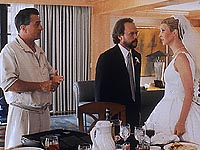
The dysfunctional family has been in the pop-psych pantheon for so long that it was only a matter of time before Hollywood came up with the bright idea of highlighting a dysfunctional Family – as in mafiosi. Actually, crime clans in the movies have always been clinical cases; it’s just that until recently, nobody thought to put them on Prozac. The HBO series The Sopranos features James Gandolfini as an anxiety-choked New Jersey mob underboss who begins seeing a psychiatrist (played, fittingly, by Lorraine Bracco, from GoodFellas). Now there’s the new Robert De Niro comedy Analyze This, which proceeds from the perfectly reasonable assumption that gangsters are human, too. They may even need some counseling in order to become happy, well-adjusted gangsters. Paul Vitti (De Niro), ascending to his role as crime-family capo, suddenly finds himself experiencing panic attacks. He backs down from whacking one of his rivals as his goons look on dumbfounded. Things get worse. He bawls uncontrollably; his mistress no longer turns him on. Vitti’s bodyguard, Jelly (Joseph Viterelli), delivers his boss to a psychiatrist (an unduly dour Billy Crystal) with all the trepidation of feeding him to the fishes.
The spectacle of a Mafia boss crying his eyes out in therapy, or being asked to work out his rage by slamming a pillow, almost compensates for this comedy’s many missed opportunities. Harold Ramis – who directed from a script he co-wrote with Peter Tolan and Kenneth Lonergan – doesn’t get maximum laughs from the material because, on some level, he seems to think therapy might actually work for his crime capo. What should be a send-up of both mob movies and touchy-feely psychiatry ends up being more like a winsome buddy film about a pair of self-actualized commanders-in-chief with matching baggage: Vitti had a distant relationship with his crime-boss dad, and Ben Sobol, the psychiatrist, has his own Oedipal load. His pop-therapist father (Bill Macy), author of the best-seller Tell Me What You Feel, Tell Me What You Want, regards his son as a mope, and won’t even guarantee an appearance at Ben’s impending wedding to a TV newscaster (Lisa Kudrow). Ben and Vitti learn life lessons from each other. And what we learn – yet again – is that potentially terrific comedies are often whacked by filmmakers who feel the need to spread a little therapy themselves.
Nevertheless, it’s still possible to have a good time at this movie, and the primary reason is De Niro. He turns himself into a great big crybaby goon: At times, Vitti is like a made-man version of Lou Costello. (Ben is his Bud Abbott.) He’s a guy who’s always on the lookout for enemies but is totally flummoxed in confronting the enemy within. He approaches his analytic sessions as if they were summit meetings. Usurping the doctor’s armchair, he swigs a Scotch. Initially on guard, he begins to catch on to the ritual – he’s a fast learner. With his crook’s wiles, he sizes up Ben’s weak points and turns the tables. It’s like learning a new scam.
De Niro was reportedly wary of lampooning his trademark mafioso character, but the truth is, it’s high time he lightened up. He’s been coasting for a long time on his Greatest Living American Actor rep. When he plays a serious role now, mostly what we get are the tics and flourishes of a once formidable talent. There’s a sameness to his presence, because this actor who used to set off depth charges chooses to keep things on the roiling surface. He’s become a kind of brand name. You know what you’re getting when you see him: a woozy wariness, a modicum of danger, world-weariness, a cracked smile.
But comedy – in its largest sense – brings De Niro back to life as an actor; it always has. Back in 1970, when he was first becoming recognized in the movies, he appeared in Brian De Palma’s Hi, Mom! as a Vietnam vet guerrilla terrorist/porno-peep-show player, and he gave it a revue-sketch jive. In Mean Streets and Taxi Driver and, for some of the way, Raging Bull and King of Comedy, he brought out the comic horror in derangement as nobody had ever done before. He was unreachable in a new and ghastly groove that seemed peculiarly modern – both in-your-face and far gone – and his chill cackle carried no overtones. De Niro was the emblematic actor of his generation because he seemed to embody the country’s furious contradictions. Later on in his career, after the heat burned off his performances, he could still refresh himself with a wonderful doodle of a comic turn, as he did in Wag the Dog, playing a presidential adviser with a poise so calculated it seemed like effrontery.
De Niro is having fun in Analyze This in the same way Brando did in The Freshman when he lampooned his Don Corleone. Brando was attacked for that movie as if he’d committed sacrilege, and yet he’d given a real performance. He twirled our memories of him in The Godfather, incorporating all the jokes and takeoffs that had built up around his portrayal over the years. De Niro’s twirlmanship isn’t as adept, but it recalls the improv-class looseness of his Hi, Mom! days. His presence here is such a whammy that we may never be able to keep a straight face watching him play another deadly goombah. If we’re lucky, maybe he won’t want to play those roles anymore anyway.